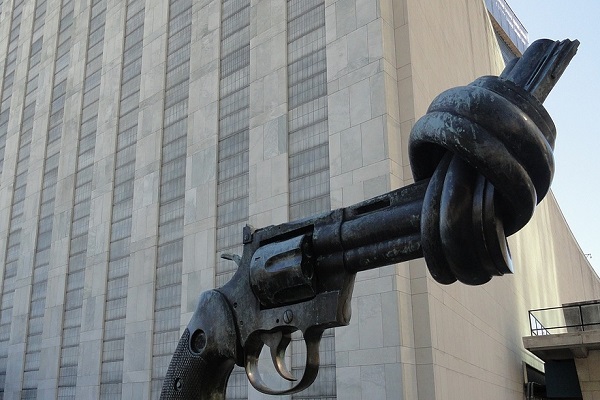
Buddhist Priest and author Zenju Earthlyn Manuel describes how Buddhists must respond to gun violence.
There are things and events that trigger fear in every individual. Fear experienced once in a while can easily be tackled. But often the most difficult type of fear to deal with according to Buddhist priest and author Zenju Earthlyn Manuel is fear that has accumulated over a lifespan.
How Buddhists Can React to Gun Violence[/tweetthis]
In one of her articles, Manuel pointed that instead of being too much concerned about terrorism and violence, it’s more important to tackle the real terror within. As Manuel writes “We constantly speak of terrorism in the world, but we don’t necessarily acknowledge the terror that has invaded our inner worlds. Instead, we present ourselves as brave or courageous.”
The first way to deal with fear according to Manuel is to acknowledge its presence. A lot of individuals try to tackle fear by acting courageous and pretending that there is nothing to fear about. This, according to her results to the individual’s disconnection from everyone and everything. It’s important to take note that fear is a natural part of all living beings. Once an individual learns that it’s okay to be afraid, the terror, anxiety or pervasive worrying in the mind eventually begins to subside.
After acknowledging it, the next way to deal with fear is to eventually release it slowly or bit by bit. Breathing exercises and meditation is a good way to do so. With each “breathe ins” we acknowledge fear and the hindrances that fuel it. Among the hindrances taught by Buddha include Sensual Desire, Ill Will, Sloth and Torpor, Restlessness and Remorse and Doubt. And with each “breathe outs” part of the fear including those hindrances should be released.
There are also alternative ways to release or reduce fear. For Manuel and her father, they found creating writing to be an effective outlet.
Responding to gun violence
Many Americans are concerned with the recent incidents of mass shootings and murders. And instead of panicking or being paranoid about gun violence, another Buddhist writer suggests how Buddhists should respond to it.
According to Lewis Richmond, the most appropriate response is to know the facts instead of relying on emotion. Richmond cited that “Buddhism is based on observation of how things actually are. So I feel our response as Buddhist should also be based on facts rather than emotion.”
To prove his point, Richmond presented gun-related statistics in the U.S. Even with the recent media hype on mass shootings and gun crimes, gun-related violence in the U.S. has interestingly dropped over the last 30 years. With the issue on gun control, statistics showed that the ratio of gun-owning households also dropped over the last 20 years. Many also fear terrorism threats but statistics showed that gun-related crimes are higher in number than the total number of terrorist victims in the U.S. or victims of the Vietnam, Iraq and Afghan wars combined. Finally, Richmond pointed that the incidence of war or global violence has steadily dropped over the last 1,000 years.
Buddhists should react to violence with non-violence or non-harm. Everyone should remember that things happen for a reason. Richmond wants everyone to avoid dehumanizing or vilifying perpetrators of such crimes. According to him “An eye for an eye is a visceral response that seems to satiate our own rage, but Buddhism teaches that there are many eyes, not just the ordinary flawed human one. One of those is the wisdom eye which sees things just as they are, whether good, bad, or incomprehensibly evil, and responds appropriately.”
In the end, Richmond stressed the importance of careful study and reflection, patience, and not forgetting the lessons of past violence and wars.
